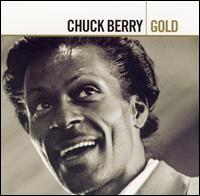 Lots
of folks have laid claim to inventing rock 'n' roll,
but no one - not even Elvis - has a stronger case than
Chuck
Berry. He took urban blues, framed them on a country
blueprint, turned up the volume, and - presto - let
it rock! Chuck's chugging guitar riffs and keen adolescent
perspective influenced rockers for decades to come,
and his hits burrowed into our cultural psyche. When
we think of rock 'n' roll, we think of Chuck Berry
- whether we know it or not. Moreover, Berry established
the guitar as the phallic symbol of choice for young
musicians, and his lyrics set a standard for invention,
humor, and poesy that has rarely been matched - Bob
Dylan wishes he could write a song as brilliant
as "Nadine." Over the years, the Beatles,
the Rolling Stones, the Beach Boys, Creedence Clearwater
Revival, Big Star, the Sex Pistols and countless others
have acknowledged the debt they owe Chuck Berry, and
it is nearly impossible to overstate his importance
in the history of rock 'n' roll.
Lots
of folks have laid claim to inventing rock 'n' roll,
but no one - not even Elvis - has a stronger case than
Chuck
Berry. He took urban blues, framed them on a country
blueprint, turned up the volume, and - presto - let
it rock! Chuck's chugging guitar riffs and keen adolescent
perspective influenced rockers for decades to come,
and his hits burrowed into our cultural psyche. When
we think of rock 'n' roll, we think of Chuck Berry
- whether we know it or not. Moreover, Berry established
the guitar as the phallic symbol of choice for young
musicians, and his lyrics set a standard for invention,
humor, and poesy that has rarely been matched - Bob
Dylan wishes he could write a song as brilliant
as "Nadine." Over the years, the Beatles,
the Rolling Stones, the Beach Boys, Creedence Clearwater
Revival, Big Star, the Sex Pistols and countless others
have acknowledged the debt they owe Chuck Berry, and
it is nearly impossible to overstate his importance
in the history of rock 'n' roll.
To top it off, Chuck's band was anchored by Johnnie
Johnson, one of rock's all-time great pianists,
and, it has been alleged, co-author of Chuck Berry's
music. Mr. Johnson, in fact, was the inspiration for
one of Chuck Berry's greatest songs - the real "Johnny
B. Goode," albeit one who played eighty-eight
black-and-white keys rather than six silver strings.
Johnson's playing is mixed low on a lot of Berry records,
but listen closely - many people claim Chuck stole
his guitar licks from Johnnie! Later in life, Johnson
became an artist in his own right, most impressively
with Johnnie
Be Bad (1991). Widely praised by the Keith Richards,
Eric Clapton, and others, Johnson was inducted into
the Rock
& Roll Hall Of Fame in 2001, and he died in
2005.
It has been said that Chuck Berry's songs have a certain
sameness. True, if only in the frequency he deployed
that trilling guitar obbligato that introduces about
half of his songs (c.f. "Roll Over Beethoven").
The more you listen, though, the more his songs distinguish
themselves, if only in their narrative. Chuck Berry
wrote stories as much as songs, little tales of the
lives of the teenagers that bought his records (never
mind he was nearly 30 when he achieved stardom). Cars,
girls, and rock 'n' roll were his universe, and it
was a place we all wanted to go. His unique, almost
dyslexic use of language raised these teenaged tales
to the level of mythology. Hits like "Maybelline,"
"Back In The USA," "School Days,"
and others too numerous to list sound as vital today
as they did upon release - and their stories ring just
as true.